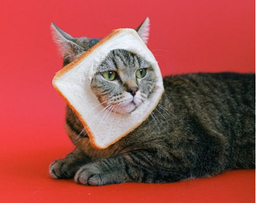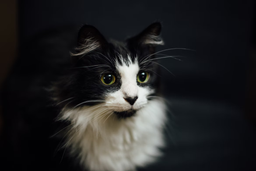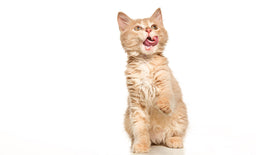Why is taurine in cat food essential? Untamed has the answer!
As a cat parent, you will most likely have heard of taurine and how important it is in your cat’s diet.
Since the mid-1980s, feline nutritionists have understood the role of taurine in keeping cats healthy, as well as knowing the long-term consequences of too little of this amino acid in your kitty’s food.
Commercial cat foods—whether wet or dry—contain enough taurine for your cat’s needs, but you may need to exercise more care with homemade, raw, or tailor-made food to make sure your cat gets the necessary amounts.
Untamed takes you through the science behind taurine in cat food and helps you ensure the diet you choose keeps your feline as healthy as possible.
What is taurine in cat food?
Taurine is an amino acid that cats need in their diet.
Amino acids are the building blocks of proteins and are essential for the formation and maintenance of:
- Muscles
- Skin and coat
- Organs
Most animals can synthesise taurine from the proteins they eat by breaking them down into their constituent amino acids and recombining them as taurine.
Cats can’t do this, so they need relatively large amounts of taurine in the ready-made form in their food.

Is my taurine hit ready yet?
Source: Arina Krasnikova
What does taurine do?
Taurine is responsible for the health and maintenance of the following systems in a cat’s body:
- Eyes
- Heart
- Digestive tract
- Reproductive function
The importance of taurine for cats’ eyesight
Taurine forms a large part of the light-sensing cells in a cat’s retina.
These cells—known as rods and cones due to their respective shapes—process light coming into the eye and turn it into neurological impulses for the brain to interpret.
The amino acid is also found in the retina itself, meaning that a lack of taurine can lead to:
- Night blindness
- Inability to discern colours
- Eventual complete loss of sight
How taurine strengthens the feline heart
In the 1980s, taurine was found to play a role in maintaining the correct level of calcium and other minerals on either side of the membranes in a cat’s heart.
If the mineral levels in a feline heart are imbalanced, the heart muscles can no longer contract correctly.
This can cause gradual heart failure in a cat that isn’t getting enough taurine.
The role of taurine in maintaining digestive tract health in cats
Taurine helps a cat’s body produce bile, which allows fat to be digested.
Without sufficient taurine, felines cannot process the fats they need for:
- Energy
- Skin and coat health
- The delivery of essential fatty acids to maintain cell structure
The inability to produce bile can lead to diarrhoea and nausea. Your cat may then stop eating, which can cause further complications and damage.
The relevance of taurine for cats’ reproductive function
Taurine is linked to the failure to carry kittens to full term, retarded growth in kittens, and poor health among pregnant queens.
Both mummy and her kittens need high levels of taurine in their food to ensure healthy growth.
What foods contain taurine for cats?
Taurine is naturally found in meat.
Cats have evolved as obligate carnivores, and their bodies can process animal protein much more efficiently than protein from vegetable sources.
In theory, a cat can eat a vegetarian diet but would have to consume considerably larger quantities to satisfy the amino acid requirement.
The efficiency of each common protein source can be measured by looking at its biological value—what percentage of the protein source is metabolisable.
The most frequently used protein sources and their biological values are as follows:
|
Protein source |
Biological value (how much of a protein source a cat can use) |
|
Chicken |
98% |
|
Tuna, salmon, sardines, or prawns |
94% |
|
Beef and pork or ham |
87% |
|
Soya |
68% |
|
Wheatgerm, corn, sweetcorn, and other vegetable proteins |
Below 65% |
All organ or muscle meat contains taurine, but its digestibility will influence how much your cat must eat to ingest enough.
Sticking to a diet based on chicken, lamb, or fish should guarantee that your feline gets enough taurine.
All commercial cat foods are regulated by the Association of American Feed Control Officials (AAFCO) and its European counterpart, the European Pet Food Industry Federation (FEDIAF). So, to be allowed to claim that a food is “complete and balanced,” both organisations insist that the food must contain enough taurine to cover a cat’s needs.
If a food has “complete and balanced” on the label, the taurine content is high enough for your feline.

The best protein sources are rich in taurine
Image (c) Untamed
Can you get a taurine cat food supplement?
If you are worried that the food you are giving your feline may not be providing enough taurine, you can supplement the diet with a variety of over-the-counter products, but you should talk to your vet about which supplement to choose.
While the AAFCO and the FEDIAF regulate the manufacture of cat food, supplements are not subject to strict regulation. Not all supplements are equal, but your vet should be able to point you in the direction of a good one.
Taurine supplements are essential if you have decided to put your cat on a diet that is:
- Vegan
- Vegetarian
Neither of these options is good for a cat, and you should always consult a specialist if you choose to avoid meat in your feline’s diet.
If they are meat-based, even foods designed to address specific medical conditions should cover your cat’s taurine needs without you needing to add extra. These special-needs foods can include:
What’s the best way to make sure your cat gets taurine?
If you want to ensure your feline is getting enough taurine, introduce a high-quality, meat-based diet.
With the huge variety of foods on the market, choosing between good and not-so-optimal isn’t easy.
The information you need to decide whether or not a food is good is on the label—all you have to do is know what to look for.
The two crucial elements to check out are the:
- Ingredients list
- Guaranteed analysis
The ingredients list
There are a few laws in place across the U.K., the U.S., and Europe that govern ingredients lists, and here is what they state regarding:
- The order of ingredients
- The completeness of lists
- Ingredient splitting
- Artificial additives
Order of ingredients
Ingredients have to be listed in descending order of volume, so the ones with the largest share should be listed first.
Completeness of lists
All ingredients have to be listed, but some “catch-all” terms are allowed, such as:
- Meat and animal derivatives
- Animal by-products
As a general rule, you should be wary of ingredients you can’t identify. A manufacturer can use these vague terms to get away with adding whatever ingredients happen to be the cheapest at the time of production. They do not necessarily suggest a high-quality product.
Ingredient splitting
Producers are allowed to treat various processing methods as different ingredients.
As an example, corn in cat food may be listed as:
- Corn meal
- Ground corn
- Corn gluten
It is all corn, but splitting it by processing methods makes each ingredient smaller by volume, so meat keeps its position at the top of the list.
Artificial additives
Manufacturers have to list artificial additives but can group them as:
- Flavourings or flavour-enhancers
- Artificial preservatives
- Artificial colourants
There is no requirement to name each of the additives, but these generic terms can hide all kinds of E-numbers.
The guaranteed analysis
The guaranteed analysis tells you what percentage of each major food group is in the dry matter of the product.
By law, the analysis should state the percentage of:
- Protein
- Fat
- Carbohydrates
- Moisture
Some manufacturers go beyond this and include information on:
- Ash—How much of the product is indigestible and remains after the product is burned
- Vitamins or minerals—If the manufacturer has claimed that the food has certain levels of a substance, they may include this in the guaranteed analysis
The guaranteed analysis is only a measure of quantity, not quality.
To get the full picture of the quality of cat food—and whether it contains what your feline needs—you must look at both the ingredients list and the guaranteed analysis.
Here are some examples of what you might find by comparing the two lists:
|
Guaranteed analysis says |
Ingredients list says |
Is the food good or bad? |
|
High protein percentage and high fat content |
A large amount of grains and cereals, but meat first on the list. Three types of vegetable oil listed |
Bad—Both the protein source and the fat content may be primarily vegetable-based |
|
High protein and fat percentages |
Meat in the first place, but a lot of emulsifiers, binding agents, and flavourings |
Bad—The protein and fat contents only refer to the dry matter, and the emulsifiers and binding agents don’t add nutritional value |
|
High percentage of protein and up to 20% fat |
Short ingredients list with a defined meat source, no additives, clear fat content |
Good—The protein is meat-based, and the manufacturer is not trying to hide any ingredients behind catch-all terms |
Whatever your analysis of the food reveals, if the label says “complete and balanced,” the food will contain enough taurine to satisfy your feline’s needs.
What happens if your cat doesn’t get enough taurine?
While every commercial cat food with a complete and balanced certificate contains enough taurine, the story may be different in the case of home-cooked cat food.
As mentioned above, too little taurine in cats’ diets can seriously affect their long-term health.
The taurine insufficiency may only become apparent after months or even years.
If you are not using commercial cat food and notice any of the following symptoms, you should check with a vet to determine whether a taurine deficiency may be the cause:
- Gradual deterioration in vision
- Long-term digestive issues
- Lethargy, difficulty breathing, or chronic coughing
- Changes in litters of kittens
Gradual deterioration in vision
If you notice your cat is more reluctant to venture out at night or move around in the dark, this may be a symptom of the early stages of retinal degeneration.
As the rods and cones in your cat’s retina deteriorate, you may also notice that colours your cat previously recognised are no longer being picked up.
The deterioration will be gradual, so you may not notice any symptoms for a long time (between six months and two years). By the time you catch them, the damage may well be irreversible—the best a vet will be able to do is preserve the remaining vision.
Long-term digestive issues
If your cat seems to have slight digestive issues accompanied by lethargy, too little taurine may be at fault.
The difficulty your cat has metabolising fatty acids can also lead to:
- Skin and coat deterioration
- Immune deficiencies
- Dental problems
- Diabetes
Lethargy, difficulty breathing, or chronic coughing
Any heart problems caused by low dietary taurine levels will be followed by:
- Lethargy
- Breathing difficulties
- Chronic coughing
A rigorous course of taurine supplements can alleviate the worst of a heart condition, but if left undiagnosed and untreated, the next stage could include:
- Seizures
- Paralysis of the hind legs
- A heart attack
Changes in litters of kittens
If your female cat has a litter significantly smaller than previous litters, or if the kittens seem underdeveloped, she may be experiencing a taurine deficiency.
Your vet can run blood tests and offer supplements as required.

Taurine makes sure mummy and babies are healthy and happy
Source: Claudio Herrera
Can a cat get too much taurine?
With all the above conditions, prevention is by far the best route.
Feeding your cat sufficient amounts of taurine by making sure the diet contains enough meat can stop any of those conditions from becoming serious.
Cats—like humans—can suffer any condition commonly caused by insufficient taurine independently. As cats get older, their eyesight, heart function, digestive efficiency, and reproduction ability will naturally deteriorate.
Providing enough taurine in their diet ensures that the problems are not made worse by the lack of an essential element in their diet.
The question remains whether a kitty can have too much of a good thing, but there is no evidence of too much taurine causing any problems for cats.
All the research conducted since the 1980s indicates that excess taurine is quickly absorbed and excreted via the faeces and urine.
Does Untamed cat food contain taurine?

Untamed has everything your cat needs and loves!
Image (c) Untamed
Untamed is committed to providing your feline with the ultimate in cat nutrition.
Our food contains high taurine levels—enough to ensure your feline’s dietary requirements are met.
All Untamed recipes are made according to the following principles:
- High levels of animal protein
- Hypoallergenic ingredients
- Gentle steaming
- Vet-formulated recipes
- No artificial additives
- Human-grade ingredients
High levels of animal protein
Our products contain up to double the amount of animal protein offered by most commercial manufacturers.
Your cat will benefit from the goodness, and you will see the difference in their muscle tone, energy levels, and coat sheen.
Fussy cats will also go mad about the taste because our recipes are irresistible!
Hypoallergenic ingredients
Every Untamed product is made with hypoallergenic ingredients, so even the most sensitive cats should enjoy our food with no allergic reactions.
Gentle steaming
We don’t overcook our products but steam them gently to ensure:
- Harmful bacteria are destroyed
- All the goodness is sealed in
Vet-formulated recipes
All our recipes have been formulated in collaboration with vets to make sure our products are:
- Complete and balanced
- The best a cat can get
No artificial additives
Our products are free from grains and cereals and contain no artificial:
- Preservatives
- Additives
- Flavour-enhancers
We offer cat jelly and gravy full of all-natural goodness!
Human-grade ingredients
We only use human-grade ingredients from sustainable sources to ensure that your kitty gets the best of the best.
Discover what Untamed can do for your kitty by giving us a try!
How to get Untamed
You owe it to your cat to make sure that taurine insufficiency isn’t an issue—Untamed is the best way to do it!
Switching to an Untamed diet couldn’t be simpler—ordering our cat food online only takes a few clicks:
- Visit our Try Now page
- Tell us more about your cat
- Select a meal plan and place your order
As soon as your trial pack has been devoured, you should let us know which flavours your kitty loved the most! Our service includes delivering cat food at the same time each month, so your pet pantry won't run dry.

Happiness on your doorstep with Untamed!
Image (c) Untamed
Within a few days, you should start noticing the difference:
- After a week—You should see an increase in energy and alertness, with less mess in the litter tray
- After two months—Your kitty should be leaner and fitter, with better muscle tone
- Within four months—You will start to see kitty’s coat gleaming and fewer hairballs being produced
- Life-long—Your cat should be active, happy, and able to manage weight naturally

![Best food for Ragdoll cats in the UK [Broken Down]](http://untamed.com/cdn/shop/articles/featured_best_food_for_ragdoll_cats_uk.jpg?v=1646818249&width=256)

